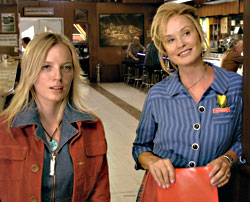Collaborating again 22 years after Paris, Texas, Wim Wenders and his writer-star, Sam Shepard, make a great show of ridiculing the location movie-set antics that Shepard’s fallen cowboy actor abruptly flees in a flurry of self-disgust. You’ve got some snarky AD scooting around glorious Moab, Utah, on his Segway, unwilling to touch his sneakers to the red earth. George Kennedy—is he still alive?—plays the ineffectual old-coot director. Marley Shelton is the dim blond ingenue, who insists she can’t say her lines to Shepard’s stand-in. Then Tim Roth shows up as the evil insurance-bond representative, expensive suit and dark glasses signaling everything Wenders and Shepard hate about Hollywood. Well, guys, I’d love to sneer with you, only this is a case of the parodists calling the kettle black.
An exhausted nag ready for the glue factory, Don’t Come would’ve been more successfully realized by the old SCTV crew, with Wenders as an East German director trying to create a cardboard Monument Valley in the shadow of the Berlin Wall, script translated backward from the English, Indians in lederhosen, and Tex-Mex music rendered as polka. Instead, woebegone Shepard road trips through Goethe’s Great American West to see his beatific Nevada mother (81-year-old Eva Marie Saint, looking better preserved than he) and the Montana kids (Gabriel Mann and Sarah Polley) he only now realizes he fathered during a long-ago movie shoot. Also in Butte is an old flame (Jessica Lange, mother to Mann’s surly roadhouse singer), who gives the movie a needed jolt with a volcanic “Ha!” when Shepard pathetically begs her to reconcile.
I only wish she’d been as critical of her boyfriend’s script. (Come to think of it, didn’t she already do this movie—when it was called Broken Flowers?) With all its talk of missing fathers and the importance of homes and mothers, Don’t Come is meant to warn about the unsought consequences of seeking out your kin, but it’s more like a caution about going to the well one time too many. Sadly, the “my best days are behind me” melancholy of Shepard’s character is literalized in the movie. There’s no poetry to his inarticulate characters (nor in their songs); Wenders’ pacing is alternately tedious and poky; and the film’s one good scene, conspicuously, has no dialogue at all: Roth, in pursuit of Shepard, stops his Porsche SUV in the desert to shave, then snaps off his buzzing razor to experience silence for the first time in his life. For some people, at least, it’s never too late to learn.








